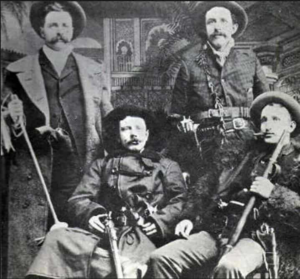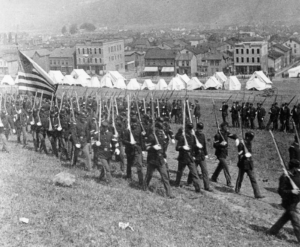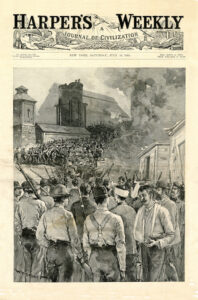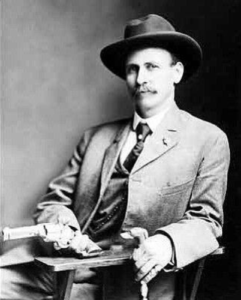The Pinkerton Detective Agency: A Journey through Shadows and Steel
June 24, 2023If only we had asked “No Country For Old Men” novelist Cormac McCarthy, to write an Old West history of The Pinkerton Detective agency before he passed this month at the age of 89…
JUST IMAGINE

Cormac McCarthy, a Pulitzer Prize-winning novelist who endured decades of obscurity and poverty before film versions of “All the Pretty Horses,” “No Country for Old Men” and “The Road” brought him a wide readership and financial security, died Tuesday in Santa Fe, N.M. His publisher, Penguin Random House, said his son John McCarthy announced his death from natural causes. He was 89.
A Tribute: Celebrating the Work of Great American Writer Cormac McCarthy
Cormac McCarthy, considered by many one of America’s greatest writers for his graphic and bleak depictions of the United States and its borderlands in novels like Blood Meridian, The Road and All the Pretty Horses, died on Tuesday at age 89.
Cormac McCarthy, maybe the greatest American novelist of my time, has passed away at 89. He was full of years and created a fine body of work, but I still mourn his passing.
— Stephen King (@StephenKing) June 13, 2023
A happy photo taken in Wales about 1966 before Cormac McCarthy and Anne DeLisle were married. The monkeys they are holding were part of an act in a show where Anne worked at the time.
Over a nearly 60-year career, McCarthy, said by critics to have stood on the shoulders of such greats as Melville and Faulkner, wrote a dozen novels, many of them critically celebrated with some even receiving the film treatment. For years, he wrote while living on grants, including the MacArthur grant (typically given to geniuses) which he was awarded in 1981.
McCarthy flew under the mainstream radar for much of his career, but this all changed with All the Pretty Horses, the first installment of his Border Trilogy, which became a bestseller and won the 1992 National Book Award. By 2006, Blood Meridian, a blood-soaked tale of massacres and scalping in northern Mexico in the 1840s, was given third place in a Time magazine list of the 25 greatest American novels. He reached an even wider audience via film adaptations of books including acclaimed No Country for Old Men (2005) starring Javier Bardem and the Pulitzer prize-winner The Road (2006).
Cormac McCarthy changed the course of literature,” Nihar Malaviya, the CEO of Penguin Random House, said in a statement…
“For sixty years, he demonstrated an unwavering dedication to his craft, and to exploring the infinite possibilities and power of the written word,” Malaviya said. “Millions of readers around the world embraced his characters, his mythic themes, and the intimate emotional truths he laid bare on every page, in brilliant novels that will remain both timely and timeless, for generations to come.”

With the assistance of ChatGPT,
A True Story of The Pinkerton Detective Agency,
stylized as Cormac McCarthy might have given his readers.
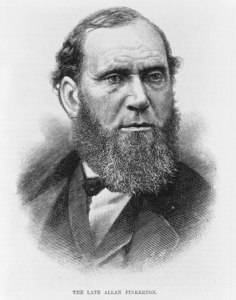
The Late Allan Pinkerton. Illustration from Harper’s Weekly, July 12, 1884. p.452. Prints & Photographs Division.
Introduction:
In the annals of investigative history, there exists a name cloaked in darkness, whispering tales of intrigue and safeguarding the realm. The Pinkerton Detective Agency, birthed by the enigmatic Allan Pinkerton, a Scottish immigrant turned hunter of truths, emerged from the bowels of a restless nation. From its modest inception as a humble detective firm in the mid-19th century, the agency grew into a formidable force, reshaping the boundaries of security and risk management, its tendrils reaching out to protect the sacred and expose the profane.
Allan Pinkerton: A Serendipitous Journey into the Abyss
Allan Pinkerton, a man fated to dance with shadows, wandered a twisted path into the realm of investigation. Fate, that fickle mistress, led him astray from his cooper trade, propelling him into the den of counterfeiters. The capture of these elusive criminals, an unexpected victory, seized the attention of local authorities and set Pinkerton on an uncharted course of detection.
In 1849, Pinkerton met lawyer Edward Rucker, and the two joined forces, igniting a flame that would birth the legendary Pinkerton Detective Agency. The agency’s early successes included the capture of a train robber and the recovery of stolen goods worth $80,000.
The agency’s name changed to the Pinkerton National Detective Agency in 1850, and it began to expand its services. In addition to investigating crimes, the agency also provided security services for businesses and individuals. The Pinkerton Agency became known for its motto, “We Never Sleep,” which reflected its reputation for working tirelessly for its clients.
The Pinkerton Agency: A Phoenix Rises from the Ashes
Allan Pinkerton, the harbinger of justice, erected the Pinkerton National Detective Agency, its stronghold situated in the heart of Chicago, a city pulsating with primal energy. Rumors of their unconventional methods spread like wildfire, their prowess in the arts of subterfuge and their web of informants unmatched by any. The Pinkertons, the name on the lips of those yearning for truth, swiftly earned a reputation as the epitome of investigative mastery, their services sought by those desperate to bring desperados to justice.
Beginnings: How this Civil War spy became a legendary lawman in the Wild West
Allan Pinkerton first got into detective work before the Civil War. He was living in Chicago when he developed a grudge with the Banditti of the Prairie Gang. They suspected his home was used as a stop on the Underground Railroad, so they sacked it. In response, Pinkerton trailed the Banditti of the Prairie Gang, infiltrated their hideout, and observed their activities. He compiled a detailed report, handed it over to the Chicago Police Department, and they successfully took down the gang.
For his actions, he was given the title of Detective and went on to found the Pinkerton National Detective Agency. His first jobs mostly consisted of protecting abolitionist meetings, aiding John Brown during his raid of Harpers Ferry, and investigating a series of train robberies on the Illinois Central Railroad. His contact for the railroad gig was the company’s lawyer, a man by the name of Abraham Lincoln.
Legends of America: Highwaymen of the Railroad
By William A. Pinkerton in 1893
Pinkerton Detective Agency founder William A. Pinkerton (center) with railroad special agents Pat Connell (left) and Sam Finley (right) formed a major law-and-order force in the post-Civil War West. True West Archives.
The recent epidemic of train robbing in different sections of the country has naturally caused considerable discussion about the best means of checking this peculiar class of crime. Train robbing has been practiced pretty steadily in the South and West during the last 20 years, but during the last few months, outrages of this character have increased at an alarming rate. The greater portion of these occurred south and west of the Missouri River. More than any other state, Texas has suffered from this newest and just now most threatening form of crime.
My experience with train robbers began with the earliest operations of these daring criminals. There were no train robberies of any importance before the war. The first our agency had to do with were perpetrated by the Reno brothers of Seymour, Indiana.
Four of these brothers became noted as train robbers. They commenced their robberies immediately after the war and became terrors to the community in which they lived. It was impossible to get the necessary evidence to convict them. To a certain extent, they controlled, through terrorizing, some of the local judges; and the local authorities, either through sympathy or fear, were afraid to do their duty.
The Reno brothers and members of their gang were arrested countless times at Seymour, IN, after the Civil war but on each occasion they were released without reprisal. On the night of Oct. 6, 1866, they robbed a train of $12,000. Then in December, John Reno led the gang to Missouri where the gang cracked two safes and removed $22,065 from the and the Daviess County treasury.
The downfall of this gang commenced in 1867 with the arrest of John Reno, who, in company with others, had robbed the county treasurer’s safe at Savannah, Missouri. He was tracked back to Seymour, and, as there was no chance of his being extradited, a party of masked men went into Seymour and bodily carried him on board a train that was about to start for Missouri where he was convicted and sentenced to 25 years of imprisonment.
Later on, Frank, William, and Sim Reno committed several train robberies throughout Indiana, extending their operations as far west as Iowa. In the winter of 1868, they “held up” a train near Marshfield station, Indiana, forced their way into the Adams Express car, threw the messenger from the car while the train was under headway, and robbed the Express Company of $80,000. Sim and William Reno were arrested at Indianapolis. Frank Reno and Charles Anderson, another of this gang, were also arrested at Windsor, Canada. After bitterly contesting their extradition in all the courts of Canada, they were finally brought to Indiana and confined in the jail at New Albany. The people in the vicinity of Seymour became aroused because war had actively commenced against the Reno brothers, and, as these men had terrorized them for years, they were willing to take a hand in exterminating them.
One stormy night the jail at New Albany was surrounded by a band of masked men, the sheriff and jailer were overpowered, and the three Renos and Anderson were taken from their cells and hanged in the corridors of the jail. Their execution was rapidly followed by that of the other members of the gang, their sympathizers, and abettors, who lived in the vicinity of Seymour, no less than nine being hanged by the vigilance committee. For years after that, and, up to the present time, Seymour, Indiana, has been noted as a model, flourishing city, and I do not recall a single case of train robbing in southern Indiana since the execution of the Renos. In contrast, previous to this a train was usually robbed there about every 60 days.
True West Magazine: Riding The RailsThe Pinkerton Detective Agency was bound to join the movement to the West. Like so many, it followed the rails. Upon founding the organization in 1855, Allan Pinkerton signed contracts with a number of small, Eastern railroads. The original task: prevent employee theft of company property as well as goods slated for shipment. The Pinkertons’ success was noted by other railroad companies in the Midwest.

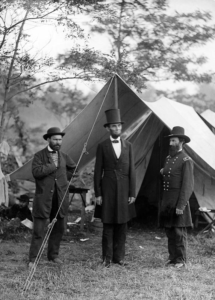
Pinkerton (left) with Abraham Lincoln and Major General John A. McClernand. (Library of Congress/Wikimedia Commons)
Protecting Abraham Lincoln: A Defining Moment in Shadows
In the grand tapestry of the Pinkerton Agency’s historical narrative, a chapter of mythical proportions unfurled, forever etching itself onto the annals of time. It was a chapter marked by destiny’s intricate threads, intricately weaving the agency’s path with that of none other than the revered Abraham Lincoln. Like a silent guardian angel, shrouded in the veils of the shadows, Pinkerton emerged as an unwavering sentinel, a steadfast defender of the Union’s ideals, as he assumed the solemn duty of being the President-elect’s shield.
As the treacherous journey to the nation’s capital loomed before Lincoln, fraught with perils lurking at every turn, it was Pinkerton who stood as a bulwark against the malevolent specter of assassination. His indomitable spirit and unwavering resolve became the foundation upon which Lincoln’s safety relied. Through meticulous planning, unwavering vigilance, and an unparalleled accumulation of intelligence, Pinkerton deftly dismantled a nefarious plot that sought to extinguish Lincoln’s radiant light while he traversed the treacherous streets of Baltimore.
In the crucible of that pivotal moment, a symphony of courage resonated, resounding triumphantly in the face of adversity. Pinkerton’s audacious efforts bore fruit, not only ensuring the safety of the President-elect but also cementing the agency’s legacy as a bastion of unwavering dedication and loyalty. The triumph in Baltimore reverberated throughout the nation, becoming a clarion call for justice, inspiring countless others to emulate Pinkerton’s valorous example.
Kate Warne enters the chat…
True West Magazine: Lady Pinkertons
Her most famous case was the Baltimore Plot, where she helped stop an assassination plot against Abraham Lincoln.
Her smile could be shy; her glance at times demure, but her ears never missed a secret. A master of disguises, she changed her accent at will, infiltrated social gatherings and collected information no man was able to obtain. She cried on command, yet was stoic while interrogating a suspect. She never, ever slept on the job. She was a detective working for the nation’s first security service—the Pinkerton National Detective Agency. Allan Pinkerton, founder of the organization and pioneer in the field, had dared to hire women as agents.
Recognized by many historians as America’s first female detective, Kate Warne persuaded Pinkerton to take a chance on her sleuthing skills in 1856. Prior to her being hired at the agency, the company’s only female employees fulfilled secretarial duties.
After a little more than four years, Warne had so impressed Pinkerton with her aptitude for investigation and observation that he made her the head of all the female detectives at the agency. In 1861, he placed her in charge of the Union Intelligence Service, a forerunner of our nation’s Secret Service. The function of the agency was to obtain information about the Confederacy’s resources and plans, and to prevent said news from reaching the Rebel army. Warne and the other lady operatives excelled at this duty. Not only did Kate make history as the first woman detective in the United States, she likely saved Abraham Lincoln’s life by assisting to uncover and thwart the plot to assassinate the President ahead of his March 1861 inauguration.
Collaboration with the Early U.S. Secret Service: A Tango of Shadows
Following the dark cloud of Lincoln’s demise, the Pinkerton Agency found kinship with the newly birthed forerunner of the U.S. Secret Service, their destinies entwined in an intricate dance. Allan Pinkerton, the guardian of secrets, even assumed the mantle of the Service’s inaugural leader, if only for a fleeting moment. This symbiotic collaboration breathed life into both agencies, their intertwined destinies shaping the course of history, with the echoes of intelligence gathering and the embrace of protective services reverberating through the corridors of national security.
Allan Pinkerton: Skilled Detective, Dubious Spymaster
General George McClellan, commanding the (Union) Army of the Potomac, the largest Federal force in the East, established the Union Army’s first intelligence organization. To lead it, he selected Allan Pinkerton, who had been actively involved in the underground railroad and whose National Detective Agency was then the largest in the country.
The two men were already acquainted, as Pinkerton once provided protection for the Illinois Central Railroad when McClellan was its vice president. Pinkerton had also earned McClellan’s respect several months prior to the attack on Fort Sumter, South Carolina, when he and a number of his detectives foiled a plot to assassinate President-elect Lincoln.
Though Pinkerton often referred to himself as “Chief of the United States Secret Service”—an agency that did not yet exist—he managed to develop a network of more than two dozen undercover agents operating throughout Washington, D.C., the Confederate capital of Richmond, Virginia, and other Southern territories.

The Violent Crackdowns on Unions and the Homestead Strike: An Overture of Discord
Within the tapestry of their legacy, the Pinkerton Agency encountered a tempest of turmoil and disapproval, their involvement in strikes and labor disputes casting a pall of controversy. While the agency safeguarded various corporations, it found itself pitted against the clenched fists of labor unions. The curtain rose on a somber act during the Homestead strike in Pennsylvania in 1892, a chapter steeped in violence and unrest, where Pinkerton detectives clashed with steelworkers, and the air crackled with tension. Blood stained the ground, tarnishing the Pinkerton name and fueling a fierce debate on the role of private security in the realm of labor disputes. The echoes of that fateful clash resonated far and wide, forever etching the Pinkerton Agency’s name into the annals of contentious history.
History.com: Homestead Strike
State militia entering Homestead, Pennsylvania, to put down the strike of July 1892.
Library of Congress, Washington, D.C.In July 1892, a dispute between Carnegie Steel and the Amalgamated Association of Iron and Steel Workers exploded into violence at a steel plant owned by Andrew Carnegie in Homestead, Pennsylvania.
With the union’s three-year contract with Carnegie coming to an end in June 1892, Henry Clay Frick, chairman and chief executive of Carnegie Steel, announced pay cuts for hundreds of Homestead workers. After refusing to negotiate with the union, he shuttered the Homestead steel mill on June 29, locking 3,800 workers out. They all voted to strike.
In order to protect the strikebreakers he planned to hire, Frick followed the example of many industrialists battling unions and called in the Pinkerton National Detective Agency.
Harper’s Weekly cover image, July 16, 1892, showing a sea of armed workers at the gates of the Homestead works.
Detre Archives, History Center.Early on the morning of July 6, around 300 Pinkerton detectives arrived on barges pulled by tugboats, but when word arrived of their approach, thousands of striking workers and their families rushed to the river to keep them from coming ashore. The two groups exchanged gunfire, with the Pinkertons armed with Winchester repeating rifles and the workers on higher ground firing down on the barges with ancient guns and even an old cannon.
After the Pinkertons repeatedly raised a white flag, the workers finally accepted their surrender by early evening. Nearly a dozen people had been killed by then, and a crowd of men, women and children brutally beat the Pinkertons who came ashore after their surrender. The governor of Pennsylvania sent 8,500 National Guard forces to Homestead, placing the plant and the surrounding town under martial law.
The Homestead debacle helped turn public opinion against the use of hired help like the Pinkertons in labor disputes, and 26 states passed laws outlawing it in the years following the strike. Carnegie’s own reputation suffered irreparable damage, with critics branding him a hypocrite and a coward for hiding out in Scotland and allowing Frick to do the dirty work.
Pursuit of Outlaws: Chasing Shadows in the Vast Frontier
Beyond the realm of labor strife, the Pinkerton Agency’s reputation grew, casting an ominous shadow over the vast expanse of the American West. Like hounds on a relentless hunt, Allan Pinkerton and his intrepid detectives pursued the legendary outlaws that roamed the untamed land. Their pursuit knew no bounds as they stalked the likes of Jesse James, the infamous Renos, and the untamed Wild Bunch. Through treacherous landscapes and perilous encounters, the Pinkertons carved their mark as relentless enforcers of the law.

HavasuNews.com: Charlie Siringo, Pinkerton’s “Cowboy Detective.”
Charlie Siringo, Pinkerton’s “Cowboy Detective,” was ahead of his time as crime-solver in the Old West.
He was a small, wiry man, cold and steady. By most accounts, he was brave, loyal, tough and exceedingly honest. Although reputed to be a crack shot, he liked to boast that he made most of his arrests without resorting to violence.
Siringo was one of the first to use undercover techniques, variously disguising himself as a robber, rustler, union member, wealthy mining man, railroad hobo, etc., in order to bring hundreds of criminals to justice. His name is linked to many well-known Western characters such as Wyatt Earp, Tom Horn, Clarence Darrow, Pat Garrett, Bat Masterson, Will Rogers, Billy the Kid and numerous outlaws.
He infiltrated the Butch Cassidy/Sundance Kid Wild Bunch as a murderer-fugitive and ultimately arrested several of the gang members.
Siringo retired from Pinkertons in 1907. He settled in Santa Fe and wrote a book detailing his experiences as a Pinkerton detective, entitled “Pinkerton’s Cowboy Detective.” When it was complete, publication of the book was held up by the Pinkerton Agency, who felt it violated a confidentiality agreement signed by Siringo when he was hired.
Siringo gave in and deleted the company’s name from the book title, instead writing two separate books, entitled “A Cowboy Detective” and “Further Adventures of a Cowboy Detective,” both published in 1912 with fictitious names replacing real ones.

A Metamorphosis of Shadows: The Transition to Threat Intelligence and Risk Management
As the new century dawned, the Pinkerton Agency, like a chameleon adapting to the shifting hues of the world, transformed to meet the evolving demands of security. With a keen eye on the horizon, they embraced the concept of proactive measures, the need to pierce the veil of uncertainty before it descended upon their clients.
Harnessing the power of knowledge, the Pinkerton Agency delved into the realm of threat intelligence and risk management. Analyzing the intricate strands of data, they wove a tapestry of insights and unraveled the secrets that lay hidden in the folds of uncertainty. Armed with this knowledge, they empowered their clients, aiding them in identifying vulnerabilities and devising strategies to mitigate potential risks. The agency’s metamorphosis marked a departure from its past, showcasing its ability to adapt and thrive in the ever-changing tides of the security landscape.
Pinkerton’s Inc. is the country’s oldest security firm, providing security guard personnel and investigative services to some of the largest businesses in the United States, including ITT Corp. and Hewlett-Packard Co. During the nineteenth and early twentieth centuries, the company emerged as a leading detective agency whose private investigators became famous for solving crimes involving the country’s railroads, banks, and businesses. Since the 1940s, however, Pinkerton’s has focused increasingly on security, developing into a business primarily engaged in guarding property; in 1990 more than 98 percent of the company’s business consisted of contracts to provide security guards.
At the turn of the century, Pinkerton began to face competition from the William J. Burns security agency, as well as from improved city police departments and other private agencies then being formed by railroad companies and other businesses. Nevertheless, Pinkerton continued to expand its operations, opening new offices throughout the country, which handled investigations for insurance claims and provided protection at racetracks and public events. Moreover, the firm began investigations into the growing Mafia presence in New York and New Orleans.
Allan Pinkerton died in 1884, and his sons William and Robert succeeded him as co-principals of the agency; William directed operations in the West from his office in Chicago, while Robert maintained an office in New York and supervised the eastern operations.
Robert Pinkerton died in 1907; his son Allan Pinkerton II took his place as head of western operations. When William Pinkerton died after suffering a heart attack in December of 1923, Allan Pinkerton II assumed the position of principal at the agency. During the 1920s, the Pinkerton Detective Agency expanded its operations both in the United States and abroad. As industry boomed, Pinkerton detectives continued to be hired as factory guards as well as to perform investigations into labor union activities. Also during this time, Pinkerton employees were engaged in resolving cases of armed robbery, particularly those involving banks, a crime that had been facilitated by the growing popularity of the automobile.
During this time, the agency increased its presence in the horse racing industry, which was beset with corruption. Robert Pinkerton personally investigated gambling syndicates, primarily in New York, as well as identifying gangs of “ringers” who fixed races by either altering the appearance of a horse or doping it. Pinkerton was largely successful in his efforts to eradicate crime from the racetrack. However, in doing so he was on several occasions targeted for murder by the syndicates and experienced several near misses.

Guardians of Shadows: Safeguarding High-Profile Individuals
As the world shrunk, boundaries dissolved, and the spotlight focused on the illustrious few, the Pinkerton Agency expanded its domain of protection. With practiced grace, they extended their shield to encompass high-profile individuals – the luminaries of society. From corporate titans to revered artists and diplomats, the Pinkertons crafted personalized security solutions, their watchful eyes scanning the vast tapestry of threats. Through the art of close protection, meticulous threat assessments, and ingenious risk mitigation strategies, they stood as stalwart guardians, ensuring the safety of their charges on both familiar shores and distant lands.
Pinkerton.com: High Net Worth Individuals
High Net Worth Individuals (HNWIs) are often targeted for their wealth and/or high-profile status and need the highest level of protection and security. Pinkerton’s HNWI program provides a strategic partnership, tailored to each client and designed to be proactive, preventive, and reactive, when necessary.
More than just physical protection, Pinkerton takes a holistic approach to provide a long-term security program that includes identifying threats, assessing risks, and implementing solutions. Your highly trained and experienced security team is fully embedded and on-site at all times. With Pinkerton, HNWIs and their families can breathe freely and live their lives to the fullest.
A Symphony of Technology and Shadows: Modern Security Solutions
In the age of technological marvels, the Pinkerton Agency embraced the ever-advancing tide, melding cutting-edge tools with their timeless expertise. From the watchful gaze of state-of-the-art surveillance systems to the intricate dance of advanced analytics, they harnessed the power of cybersecurity and delved into the depths of digital forensics. The agency’s symbiotic integration of technology and mastery in investigations and security management elevated them to the vanguard of the security industry. Their comprehensive and effective solutions stood as a testament to their unwavering commitment to their clients, merging the ethereal realm of shadows with the tangible world of security.
Pinkerton.com: Return on Investment (ROI) Analysis
Identify the qualitative and quantitative value of your security program
While there is no universal answer to how much an organization should spend on its security, Pinkerton is here to assist you in protecting what you value most and to demonstrate how your security budget can deliver an efficient ROI.
Our team works with your team to review program, incident, threat, and expenditure data to identify qualitative and quantitative trends and build threat scenarios. Then, we calculate the cost impact to determine the ROI range per security initiative, deliver a detailed analysis of findings and benchmarks, and provide Pinkerton initiative recommendations and implementation roadmaps aligned with your chosen option
Conclusion: Shadows Illuminated, Legacy Unveiled
The Pinkerton Detective Agency, an enigma wrapped in the shroud of secrecy, emerged from the depths of history, leaving an indelible mark on the landscape of private investigation, security, and risk management. Allan Pinkerton’s journey, from a humble cooper to a guardian of truth, epitomizes the unpredictable nature of destiny. From protecting President Abraham Lincoln to pursuing notorious outlaws, their history is a tapestry woven with threads of courage, controversy, and unwavering dedication.
Through the ages, the Pinkerton Agency transformed, shedding its old skin and embracing the shifting currents of security needs. Their evolution into modern security solutions, with a keen focus on threat intelligence, risk management, and executive protection, showcases their adaptability and resilience in the face of an ever-changing world. Today, the Pinkerton Agency stands as a bastion of excellence, their services combining the latest technological advancements with the timeless art of investigation and protection. With unwavering commitment, they continue to safeguard individuals, organizations, and communities, their legacy etched in the shadows they have illuminated.

Owned by Pinkerton Detective Agency employee George Bangs. Mr. Bangs was Allan Pinkerton’s right hand man. He was one of the first employees to the agency and became the General Superintendent of the Pinkerton Detective Agency.
Families Across Time: A Genealogical Journey
There is nothing more exciting than coming across family members across time. Recently I came across the photograph above. I had seen it before in books about the American Civil War but never realized there was a Bangs family member pictured. George Henry Bangs, the gaunt looking figure standing in the left of the photograph, was Allan Pinkerton’s “right-hand man”.Allan Pinkerton was a Scottish-American detective and American spy. Some say he invented “shadowing” and undercover work. Whether he did or not, he did serve as the head of the Union Intelligence Service during the first two years of the Civil War. During that period he foiled an assassination plot while guarding Abraham Lincoln on his way to Washington, D.C. George, clearly overshadowed by his mentor Mr. Pinkerton, was no less important to the fledgling detective industry.
In 1866, when Pinkerton opened his Philadelphia office, he made George the general superintendent of all his offices. George Henry Bangs was born 06 Jun 1831 in Augusta, Maine to Josiah Dennis Bangs and Pauline Augusta Brooks. He died 12 Sep 1883 in Roselle, New Jersey. What makes this connection important to me is that my wife and I lived 15 miles from the Antietam Battlefield. For three years I was stationed at the Coast Guard Operations Systems Center in Martinsburg, West Virginia. Not only did we visit Antietam on many occasions, I ran my first 26.2 mile marathon right through the battlefield and most likely jogged right past the spot on which this photo was taken. George Henry Bangs is my 6th cousin, 4 times removed.
Life is full of little coincidences, huh?

Legendary Exploits: Bringing Down Marm Mandelbaum.
In the late 19th century, Marm Mandelbaum was at the head of one of the most notorious crime rings in New York City. A Prussian immigrant, she began by recruiting child pickpockets, and she quickly escalated to dealing in all sorts of stolen goods. She had layers and layers of protection, from crooked cops to Tammany Hall politicians who recognized her power and figured that her influence was a sure way to win votes. She had lawyers on retainer should any of her thieves run into trouble, a group of cab drivers on call, and a network of associates that were credited with putting the US on the map as far as crime syndicates went.
Marm had the eyes of a sparrow, the neck of a bear and fat, florid cheeks. Her tightly rolled black hair was topped off by a feathered fascinator, which failed to distract from her homeliness. She spoke only when she had to, as if her words were as valuable as her plunder; her favorite saying, directed almost exclusively toward herself, was, “It takes brains to be a real lady.”~ Smithsonian Magazine, The Life and Crimes of “Old Mother” Mandelbaum.
“Marm” Mandelbaum, illustrated far right, as portrayed in a political cartoon (Photo: Library of Congress/LC-DIG-ppmsca-28209)
When the district attorney decided it was high time to take her empire down, there was a problem. She had gotten as far as she did by being smart and being cautious, and one of her cardinal rules was not to deal with anyone she didn’t know. No one knew just how many cops were on her payroll, either, but the DA did know that word of any sting operation would make its way back to her.
Enter the Pinkertons, specifically, a Pinkerton agent named Gustave Frank. Frank spent five months getting into the door of her syndicate, posing as a dealer in one of her favorite commodities—silk. He passed all her tests, cutting off and “disposing of” identifying marks on bolts of silk, all the while asking for an in with her, looking to buy stolen silk. After weeks of research and months of surveillance, he not only started buying stolen silk from her, but he also confessed to be not just a merchant but a lifelong criminal. Eventually, he bought more than 11,000 meters (36,000 ft) of stolen silk worth thousands of dollars, while tracing the silk back to those it had been stolen from by the same identifying marks that he had already shown a willingness to get rid of.
Mandelbaum jumped bail and fled to Ontario, spending the rest of her life in exile.
Pinkerton’s legacy still lives in law enforcement and security fields.
Two detective techniques that were developed by Pinkerton and his agents are still in use today in investigations.
The first is what Pinkerton called “shadowing.” This is conducting surveillance of a known target or location and recording everything so that a theme emerges from the analysis.
The second detective technique is what Pinkerton called “assuming a role.” This is undercover work in which the detective blends into the environment and infiltrates the criminal enterprise, pretending to be a member to gather insider information to stop and prosecute criminal activities.
Pinkerton’s unconventional and innovative ideas from more than 150 years ago have shaped the American security industry and law enforcement professions. His contributions on investigative work have assured his place in American law enforcement history.


